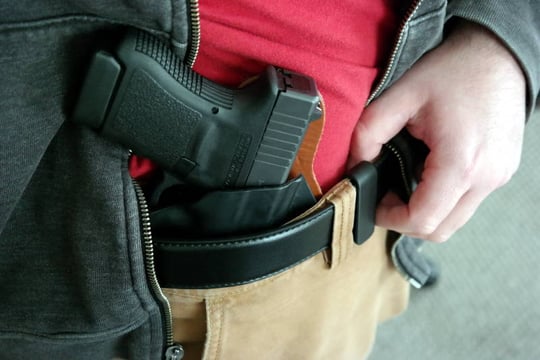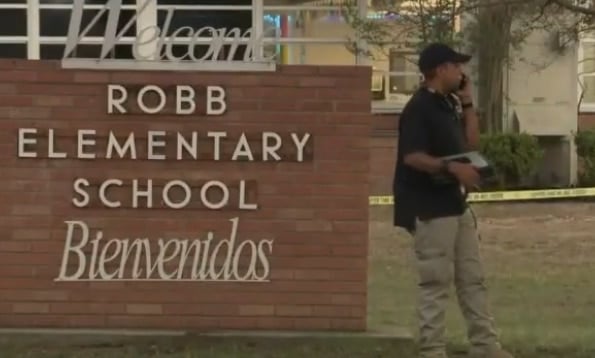The vast majority of all gun owners will never need to use their gun to defend themselves or their family. A very small percentage of the total law-abiding gun-owning population encounters what’s called a ‘defensive gun use’ situation. That is a situation where the person feels a need to draw his or her gun.
Just because the gun came out doesn’t mean the person used it. It’s still considered a defensive gun use. It should still be reported to the police. The last thing you need to think about when drawing your gun is the amount of inconvenience and paperwork you can expect to encounter after the fact. Using a gun to defend yourself is a decision. And with any adult decision, there will always be consequences. Your life is worth it.
I’m going to start this article by working through an ideal situation where a person uses a gun to defend himself and goes through the process from start to finish. This may or may not be indicative of what you will experience, personally, but it will give you a light idea of the process.

Scene: Gas Station Convenience Store
Time: Saturday Night, 10:32 p.m. EST
A concealed carrier runs into the gas station to pick up a soda and a winning scratch ticket. While at the counter, a masked man wielding a handgun enters the store, points his gun at the concealed carrier and clerk. He demands the customer’s money and cell phone and instructs the cashier to stack all the cash register’s money into a bag. The concealed carrier has his hands raised, is not printing, and says nothing to either the clerk or the robber.
About a minute, thirty seconds into the armed robbery attempt, the concealed carrier sees an opportunity to draw his concealed carry pistol to defend himself. He does so, feeling an imminent threat upon his life and that of the clerk’s life.

Drawing his concealed carry pistol from his holster, the concealed carrier decides to fire two rounds center of mass into the armed robber — realizing that any further delay would only further endanger both his and the clerk’s life.
The armed robber is hit. He runs from store but only makes it out to the parking lot before collapsing. The concealed carrier stays inside the store with the clerk and gets on his cell phone to 9-1-1. He reports that there was an attempted robbery at the store, he feared for his life and shot the robber. He indicates the robber is collapsed out in the parking lot.
AFTER ACTION
When police arrive, they will secure the scene and get the armed robber into an ambulance. Police, in this scenario, find the pistol allegedly used in the crime near where the robber collapsed.

Police take temporary custody of the concealed carrier’s pistol. That pistol is now evidence. An officer will give him a receipt for the pistol. If he is not charged with a crime, he can use that receipt to retrieve his pistol later on.
They take his initial statement at the scene. If the concealed carrier needs a permit in order to carry, they will likely ask for that permit.
They also take the clerk’s witness statement and review surveillance footage. Upon initial review of the scene, witness testimony, and surveillance footage, police make an initial determination.

At this point, they will most likely request the concealed carrier come down to the station to discuss the situation further with an investigator. If the police have no evidence to support any allegations of a crime, they will usually let him go on condition he comes back at a later time to discuss the situation. Some police will insist that the concealed carrier immediately go with them to the station for that interview.
This is the point where you will likely want to request to have an attorney present.
It’s not necessarily because you did anything wrong or that even the police think you did anything wrong, it’s about ensuring you have proper legal representation.
They will request the surveillance footage for the District Attorney’s office. They will likely take the pistol as evidence alongside the pistol recovered at the scene of the crime. Any witness statements, hospital reports, photos, and ballistic matching will be sent on to that office for a further determination.
Investigators will map out where bullet casings were found and try to account for each shot fired. This part of the investigation may take several hours or several weeks depending upon officer constraints and the overall situation.
POST-EVENT
After the event itself, you can expect to spend a chunk of time talking to lawyers to get an idea of how they would approach your individual situation. Each defensive gun use situation is unique. There are prior case precedents to consider. There is also the political skew of whatever county or city you live in to consider.
Week One is a lot of talking at inconvenient hours. A time when you would normally pick your kid up from school, you may instead be sitting in an attorney’s office or down in the court house filing paperwork. Instead of going to work one morning, you may find yourself down at the police station speaking with investigators who have follow-up questions.
The press may approach you during this time. Consult with your attorney before discussing any detail of your case with the press. One poorly worded statement, an incorrect recollection of the chain of events, or an off-color comment can all adversely affect the investigation.
If you have an attorney by this point, he will be able to brief you on where you legally stand. Given the previous scenario, it may take two or more weeks for investigators to finish their initial interviews, reviews of footage, and ballistics.
Once police compile all of the evidence and analysis, they will likely send the results to the the District Attorney’s office or other suitable legal authority. That entity will make a final determination on whether there is enough evidence to prosecute for any wrong-doing. However, that decision will likely come many months later.
Wrong-doing, in this case, can extend well past the actual discharge of a firearm. For instance, if the concealed carrier had a blood-alcohol level (BAC) of 0.08, he could potentially be charged with a crime if state law specifically forbids that. If investigators discovered he drove himself to that gas station prior to the shooting incident, he could be charged with a DUI/DWI.

Generally speaking, once alcohol or illegal drugs are detected in a person’s system, there are immediately a lot more questions surrounding the case.
Thankfully, our hypothetical concealed carrier was not drinking the night he stopped into the convenience store. He was just picking up a soda and scratch ticket. When police breathalyzed him, he registered a cool 0.00 BAC.
Because our concealed carrier
- Complied with all lawful requests
- Was not under the influence of drugs or alcohol
- Had his permit on him
- Had witness testimony and surveillance footage back up his side of the story
- Met the state’s definition for the justification of the use of deadly force
- And had no prior history of criminal offenses
…The prosecutor isn’t likely to take up the case. Because our concealed carrier has an attorney, he has an active advocate for his rights when speaking with the District Attorney’s office and investigators.
Does that mean given our prior scenario and how it played out that it will always go that way? Absolutely not.
WELCOME TO THE LONG WAIT
It may take anywhere between two to six months for the District Attorney’s office to make a final determination that the state has no evidence the concealed carrier committed any crime or wrong-doing related to his shooting of an alleged armed robber.
The case may go to a jury trial.

Because the concealed carrier has an attorney, he may have spent up to $200,000 or significantly more on related court costs, appearances, and advice depending upon the circumstances, situation, and local laws. Costs will vary greatly depending upon your choice of legal council but you can guarantee it will cost money.
It’s not at all uncommon for someone to take out a second mortgage on his home to pay for the legal fees surrounding a shooting incident. If you’re honestly considering cutting out that cost (or simply can’t afford it), I still recommend talking to an attorney. There’s no such thing as a “cut and dried” legal case involving deadly force. In hindsight it may look that way, but during the investigation and legal proceedings, it is anything but that.
Remember: after a defensive gun use situation, the state is looking for evidence you committed a crime. If the evidence doesn’t support that, they will not prosecute. If the evidence substantiates it, they will. The state isn’t in a rush to get to one decision or another. You are.
You have a life, maybe even a family and a home. For you, expect a significant disruption in time and money. If you get out of a defensive gun use situation without having wasted a lot of time or money, consider yourself extremely fortunate.
AFTER THE DECISION
Whenever the District Attorney’s office makes a final determination — or a Judge and jury do — you’ll need to get your gun from the police. There is a process called civil forfeiture.

We discuss it in a separate article. That’s the process whereby you have a certain amount of time to claim your property as yours after the state took it or else it becomes theirs.
How To Plan For Delays After Defending Yourself
As illustrated in the above scenario, there are going to be interruptions in your daily pattern of life. Things you used to do regularly may now be disrupted indefinitely.
Consider the following:
- Your children’s school/after-school schedule
- Your spouse’s work schedule
- Planned vacations
- Walking the dog
- Cleaning out the cat’s litter box
- Paying the electric bill
- Showing up to work on time
All of these things you may do now with ease and regularity. Directly after a defensive gun use incident, you may not.
Now is the time to talk to your family, relatives, other siblings to figure out who can do what if something comes up. Prefaced with the fact that nothing may ever come up, it’s good to have a plan in action if it does.
The second you can’t come home because you’re sitting in a police station, who is going to walk your dog or make sure he has food and water?
What happens if you’re injured and in the hospital during the investigation and can’t make it home for two or more weeks?
Plan now.
Outside of the inconvenience of going to repeatedly poorly timed appointments and legal counseling, you need to take care of everyday life. If you can’t, know who will.
Let’s RECAP!
After a defensive gun use scenario:
- Get to a safe, well-lit place
- Contact police
- Comply with their lawful requests
- Take receipt of your handgun if it is confiscated
- Contact an attorney
- Do not speak to the press until you have spoken to your attorney
- Make sure you have people on standby to help you with routine, required life stuff
- Prepare for immediate disruption of your pattern of life for the next several weeks and, perhaps, months
- Prepare for significant financial expenses from lost time from work, legal counsel, fees, etc.
- After the proceeding, remember to retrieve your handgun from the police by bringing in your receipt.
Your life is worth defending. Focus on proper defensive mindset, situational awareness, and keeping your life. Carry your gun, holster, and permit at all times. The rest can be figured out.



![[FIREARM REVIEW] Bersa TPR9](https://imagedelivery.net/sbm_lYeJbALkepJgtmRD5w/concealednation.org/2020/04/bersa-tpr9-02.jpg/w=728,h=381)








![[VIDEO] Armed Security Guard Gets Complacent — Almost Pays For It With His Life](https://imagedelivery.net/sbm_lYeJbALkepJgtmRD5w/concealednation.org/2017/03/houston-valero-guard-fight.jpg/w=728,h=381)

